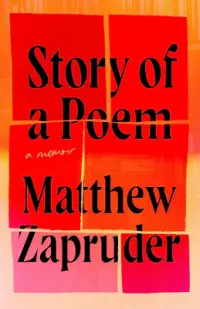I’m not sure it’s accurate to say that Story of a Poem by Matthew Zapruder found me when I needed it to find me. It feels more correct to say that things find us as they do–in this case I was out running and listening to the Otherppl podcast with Brad Listi and he was interviewing Zapruder about the book–and we make those things into what we need them to be.
What I know is that their conversation spoke to me. There was a focus on parenting and writing, their respective fatherly triumphs and struggles with children born to different challenges, something I have not experienced, yet can still feel as a fellow father and a human. What really spoke to me, however, was how we, anyone, creates anything at all. That this spoke to me is not surprising, I spend most of my time thinking about how one crafts a creative life and what that can look like. That I am working on a new book which involves a conscious rumination and exploration on the act of creation and family–as well as a focus on a single film that speaks to this, well to me and my family–only further spoke to me.
So let’s say it’s not that I was searching for such a resource, but I was primed to find something such as Story of a Poem and projected all that was in my head onto the work. Not that noting this makes the experience or need of discovering the book, much less reading the book, any less powerful. Take this passage for example from page 34:
Isn’t it a privilege, a student asks, to write poems when the world is burning? I answer, too quickly, Yes. I didn’t mean to sound exactly as I must have, dismissive and snide. I add, in an attempt to convey the sincerity I actually feel, Can we imagine we need to protect, rather than condemn, that privilege in each other…I should have said, I think of the poem as a physical space, a giant museum or forest. I go in and listen. I hear something, write it down, and emerge, hopefully for the better changed.
Or this from page 38:
I have always loved words for what they can do, and for all the different things they can mean. I love how they feel in my mouth. In that way, I am like all writers I know.
Writers don’t choose to write because we want to, we write because we have to, because once the idea of writing is in our heads, it’s impossible to avoid, it becomes our lens into the world, our feelings, a form of self-care. Though it’s also a form of narcissism. The publishing part anyway. We believe, well, have to believe, someone, somewhere cares as much as we do about what we want to say and then want to share it with the world as much as we do.
Which is to say, I believe this as much as I believe Zapruder believes all he has to say about the act of writing.
That’s not what I’m entirely interested in here though.
 What grabbed me is what he’s trying to do with Story of a Poem, write something, and use the description of that effort to explore something else, his efforts to make sense of a creative life intertwined with the parental life he’s in. I happily, even greedily, let myself be inspired by his work on the book I was crafting, quoting him and making his thinking mine.
What grabbed me is what he’s trying to do with Story of a Poem, write something, and use the description of that effort to explore something else, his efforts to make sense of a creative life intertwined with the parental life he’s in. I happily, even greedily, let myself be inspired by his work on the book I was crafting, quoting him and making his thinking mine.
To focus more fully for a moment on Story of a Poem itself, Zapruder's story is about the machinations and mental gymnastics he goes through to write a single poem, to find the words and flow. We follow him on that path, we join him as he looks back at what preceded it as well, and I would suggest that for anyone who talks about how it is hard to make writing look good on screen, to make the act of it exciting and engaging, it’s the complete inverse on the page.
Or it can be.
It also may just be me, I want to read about the creative process at play.
Though it could also just be about Zapruder, which is to say he’s a lovely, focused and intense writer, though more than that, the ways he shares the experience of creating, even becoming a writer in the first place, feels real and lived in. From page 42:
I have come to believe that writing is an endless, shifting negotiation between intention and discovery, ideas brought to the page and and ones uncovered in the process of writing itself, music and truth. Sometimes I know what I want to say. Almost always, I can only discover what I think and believe through the process of writing the poem. I have to let myself be ok with both states…
Yeah.
Zapruder never forgets however, that this is not merely an exercise in understanding how a poem gets written, it’s also about understanding how he is connected to his son, his son is connected to the world, and the act of making art is wrapped-up with both. From page 28:
What is the relation between making poems and learning to be the father of this atypical child? It felt like the same struggle, something he had been trying to learn for so long in his writing and now had to learn in his life. An irresistible force, which could be called love, always drew him back to poetry, to searching out what was strange and beautiful and mysterious and new in language…that same force, something he felt every time he looked at his son, made him want to change himself and the world.
And so it is as I tried to write a book about my love for movies and for my family. How my family of origin sees the world through the movies we watched, and still watch, and when, and how we felt and feel doing so. I am both drawn to write about this and somehow show my children what an important lens the movies we love can be for what they tell us about ourselves and the world we inhabit.
I also tried to figure out what the story of this movie love was for me, this desire to focus on a particular movie, yet all movies too. Though more than that, how doing so might help me make sense of both the family I was born into and created, and further connect with my own children. One thing one learns when trying to tell such a story is that the story is us. And maybe it always is. As Zapruder writes on page 122:
The story I thought I was in—which, to be honest, was bringing me very little happiness, and a lot of shame over the inequities upon which it depends—changed, and keeps changing. I’ve been given this great, unexpected, difficult gift. My challenge is to take everything I have learned, and live up to my story, and the love for my son.
How do we live up to our story?
I have not had the challenges Zapruder has, not as a father certainly, though during the course of Story of a Poem, Zapruder also writes about losing his father, something I know all too well, which in turns becomes part of the story. Like Zapruder, I keep trying to write through all of it however, seeking to make sense of the world as I know it and live it. The hope of course is to find insights and common ground with our readers and the larger universe. And yet, as Zapruder says, “Language is only one way of creating a shared reality. And it is only one way to understand the world.”
True, it is also, however, a starting point, as are the stories we tell with that language, and all writers, as do all people, need to start somewhere.
Get Story of A Poem at Bookshop or Amazon

About the author
Ben Tanzer is an Emmy-award winning coach, creative strategist, podcaster, writer, teacher and social worker who has been helping nonprofits, publishers, authors, small business and career changers tell their stories for 20 plus years. He is the author of the soon to be re-released short story collection Upstate and several award-winning books, including the science fiction novel Orphans and the essay collections Lost in Space: A Father's Journey There and Back Again and Be Cool - a memoir (sort of). He is also a lover of all things book, taco, Gin and street art.








